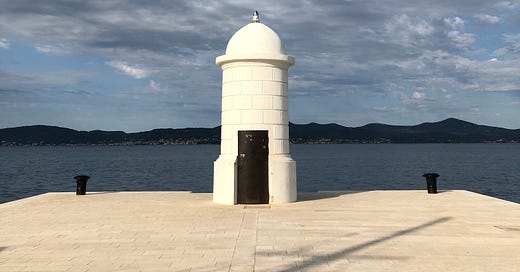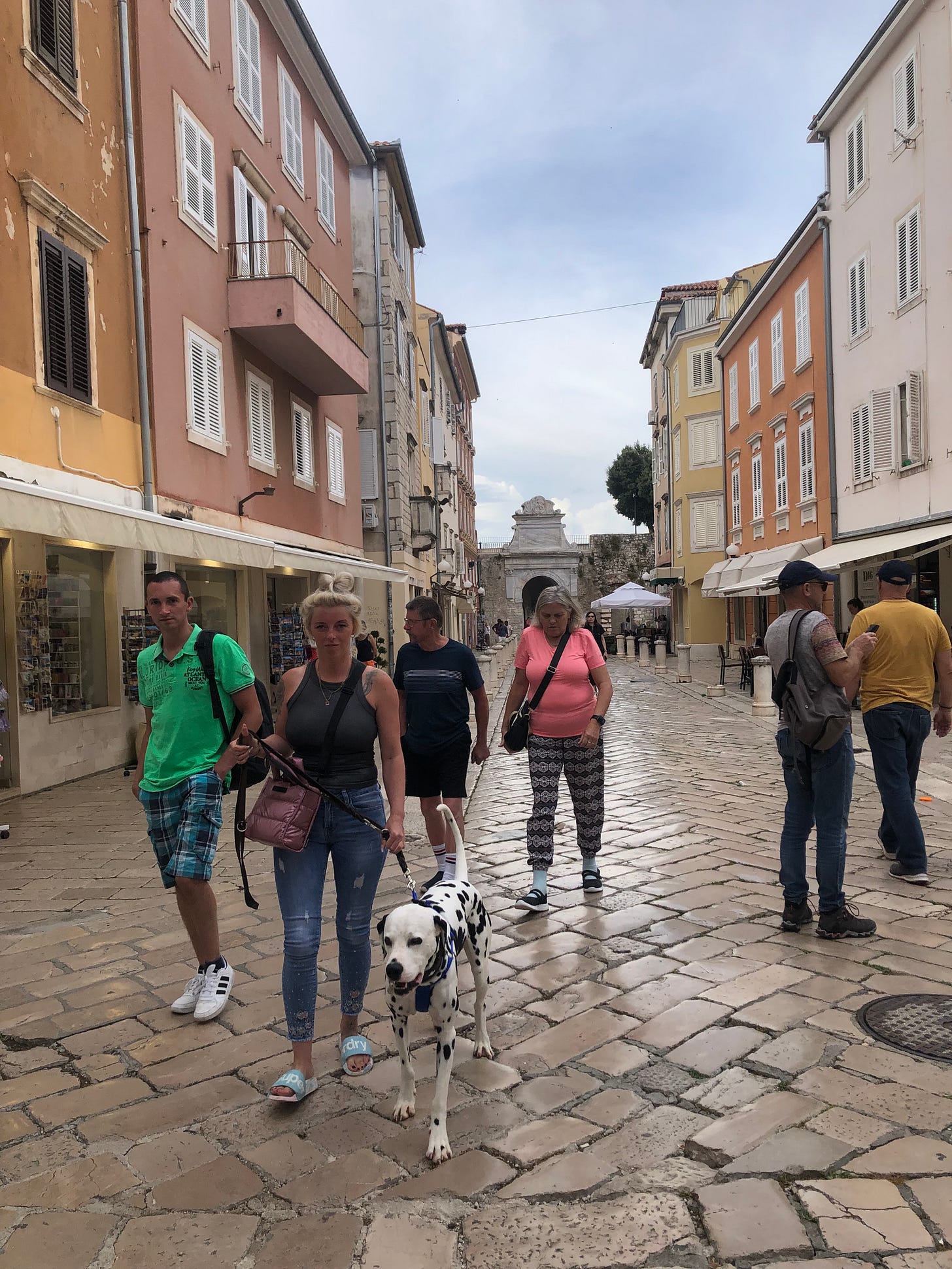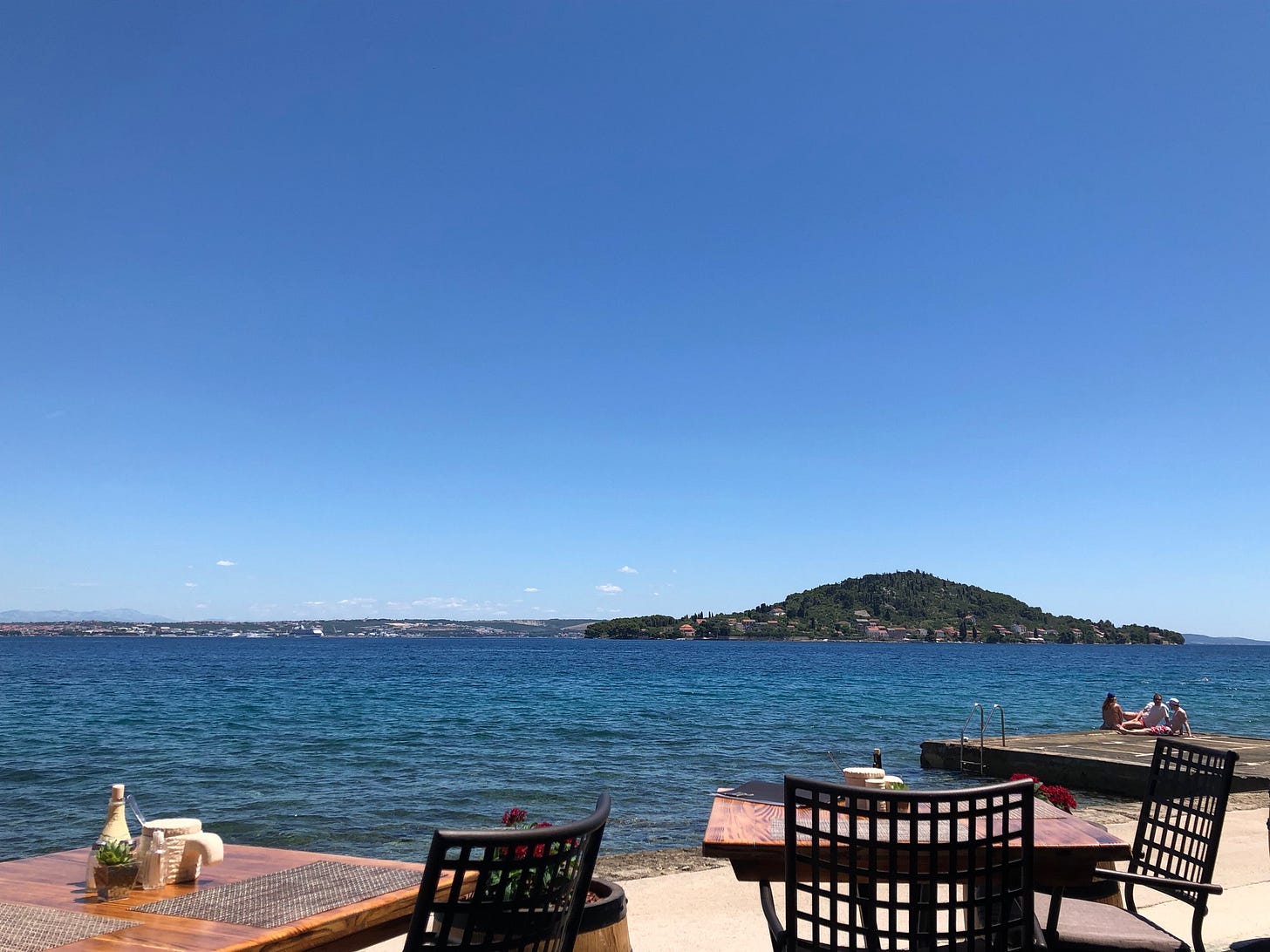I have a confession to make: I had never heard of Zadar.
As in: I literally did not know it was a place, and when I learned that it was a place, I literally had no idea where that place was located. If pressed, I would have guessed the Middle East, mostly because of the ‘Z.’
But this newsletter has a subscription option called Patron of the Unplugged for readers who are feeling especially generous. It comes with the perk of getting the chance to choose a destination for me. A few people have become Patrons, but so far, only one of them has exercised their option to play travel god, and that person was my brother, Andy. The place he chose was Zadar.
I do not know why he chose Zadar. All I know was that packing for this trip was an anxious exercise in idiotically covering all my bases: rain coat, wool sweater, bikini.
Making me feel all the more idiotic were the many, many people who obviously had heard of Zadar, and who in fact had traveled specifically to be in Zadar. People on my fully booked, direct flight from Copenhagen. People swarming out of the Zadar airport to the little Zadar rental car booths outside. People waiting in line to get on the bus that would take them to the center of what I by now had deduced was a city in Croatia, and one that, if the preponderance of flip-flops was any indication, was located on the coast.
The bus’s first stop was a ferry terminal, which proved the flip-flop theory correct. Beyond that, though, stretched industrial wasteland and enough crumbling, concrete apartment blocks to make me worry I was going to be spending the next few days in some kind of post-Soviet horrorscape that just happened to be near a body of probably radioactive water. But as we finally neared the center, I could see a nice-enough looking harbor to one side, and, on the other, a long set of ramparts through which gates led into what looked to be a medieval-ish looking town.
I took a room in the first hotel I came across, which was a good decision because it turned out that there weren’t many hotels in Zadar. The young man at reception was intensely jolly, so while he typed my information into the computer, I decided to risk offending him by asking the question foremost on my mind.
“Why do people come here?”
He raised his gaze and looked at me with what may have been clinical concern. “You don’t know why you’re here?”
I knew why I was there. What I couldn’t quite figure out, not even once I started walking around, was why all those other people were there.
Zadar, I learned, is 4000 years old, and was originally confined to one small, well-defended peninsula, before gradually expanding inland. The old city has a long, pleasant promenade along the sea, and some Roman ruins that are just kind of lying around for people to trip over. It’s got a bunch of churches in interesting shapes, and those imposing ramparts to walk along. There is something called a Sea Organ, which is not as erotic as it sounds, and which I will discuss in the next issue of this newsletter. Zadar is also home to maraschino cherries and liqueur. And admittedly, it has some killer sunsets.
But none of that seemed proportionate to the quantities of visitors crowding the old part of the city with their sunburns and ice cream cones. Nor did it explain the utter lack of any business that did not cater exclusively to tourists, often by selling rubber duckies or contributing to the pervasive scent of burnt cheese that comes from too much bad pizza being made in one place.
When a section of a city becomes not just over touristed but completely abandoned to tourism, it’s usually because the part is spectacularly beautiful and/or adorable, like Nyhavn in Copenhagen and Venice in its entirety. Or it’s because it has a beach.
Zadar has a beach, which begins just outside the city walls, and is delightful in many ways. Trees separate a patch of thin sand from the road, and give it that characteristic Mediterranean scent of pine and sea. There are long docks dotted with parents trying to work off their kids’ after-school energy, old dudes playing bocce in the shade, and groups of teenagers cannonballing into the sparkling Adriatic. It is delightful, in other words, because it is so low-key and local, and if I were from Zadar, I imagine I would have lots of great memories of the times I had spent there. But it did not seem like a beach you would travel from another country for.
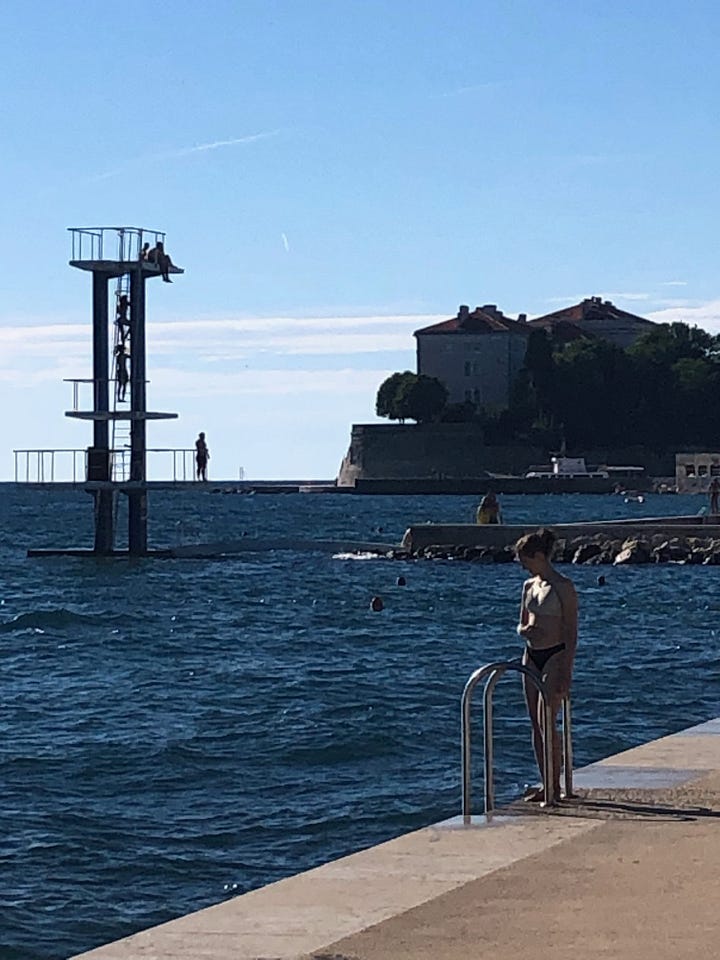

It was only once I went to the tourist office that I realized that there were of course other beaches; they just weren’t in Zadar, which, it also turns out, is part of an archipelago. When I asked one of the staff which island she would recommend for a day trip for someone without a car, she shuffled through a large stack of tiny squares of paper printed with different ferry schedules, and extracted one. Preko, a town on the neighboring island of Ugljan, was just 25 minutes away.
At 7.30 the next morning, I boarded the ferry to Preko, on the neighboring island of Ugljan, and disembarked 25 minutes later. In the port, I found a board with a map and descriptions of the local attractions. I was tempted by the fortress on the opposite side of the island with supposedly stupendous views, but also recognized that my strappy sandals were probably not up to the job of climbing there. Renting a bike and riding along the coast would have been nice, but it was 8am on a Sunday morning, and nothing was open yet. So I just started walking north along the coast.
I hadn’t gone 100 meters when all of my questions about who came to Zadar and why resolved themselves. Ugljan was beyond lovely, with pine groves cupping rocky coves and sparkling crescents of sea. The villages were laidback, with a few cafés and places renting bikes or boats, but otherwise almost nothing to buy. Someone had clearly thought about how to make the beaches as comfortable as possible, and had put up little canvas booths for changing and free recliners with slatted canopies for shade. The weather was that perfect Mediterranean mix–hot and dry in the sun but delicious in the shade; and so was the flora: grapes, olives, lavender, figs, and rosemary.
I kept walking, peering into gardens, and stopping to dip into the sea whenever I got too hot. There were almost no hotels, and although some of the homes I passed advertised apartments to rent, most seemed either like someone’s vacation house or just their house house. And there were still plenty of open spaces where there was no one at all.
I meandered along the coast for about 5 kilometers to Lukoran, went for one more swim, then decided to turn back. By now, the sun was high and blazing, so I was thrilled to come across a bus stop, and even more to a schedule taped to it promising a bus in about ten minutes. Forty unproductive minutes later, with somewhat less enthusiasm than before, I started walking back along a slightly different route.
At one point I came across a hand-drawn sign advertising locally-produced olive oil and other ‘artisan products’ and followed it to a home where a family of 8 was eating lunch in the open-air dining room that also served as their shop. I didn’t want to interrupt their meal, and I could already tell that the ‘artisan products’ were mostly the same crap sold in Zadar’s tourist shops, so I tried to back out gracefully. But they were warm and friendly and quite insistent, and we managed to have a little conversation through the overlaps between their small amount of Italian and my Spanish. In fact, I’m pretty sure they thought I was Spanish, because the matriarch told me we could still be friends even though Croatia was playing Spain that night in the Eurocup.
By this point I felt compelled to buy something, and since I didn’t want to schlep a bottle of mediocre olive oil with me, I picked up a small, cellophane-wrapped bar of lavender soap, figuring it would at least be cheap. But when I asked how much it was, my great friend, the soccer-loving matriarch exchanged a glance with her husband that I could definitely translate. It said: how much will this patsy pay?
I made it back to Preko with enough time for lunch. Earlier that morning I had passed two restaurants that looked promising, and stopped now at the first, whose outdoor tables were about 4 meters from the water’s edge, but were also baking in the direct sun. I asked the waiter if I could sit under the covered awning upstairs, but he told me no, even though all the tables up there were empty. I decided it was one of those not-infrequent moments in southern Europe where someone tells you no just because they can, and flounced off in a slight huff. Only to return a few sheepish moments later because of course the other place wasn’t open.
Apparently the waiter was feeling a little sheepish too, because he filled my wine glass nearly to the brim and explained that he was working alone that day and having to run up and down the stairs in the hot sun was just too much. I looked at his lined, sunburnt face, and felt worse, but by now Radomir had decided we were friends. He told me he was from Ugljan, but had only returned recently after living for a long time in Germany. When I asked if it had changed much, he said he barely recognized it. “People used to be much more relaxed,” he said. “Now it’s all capitalism.”
He didn’t have to tell me; I was the one who had just paid 6 euros for a tiny bar of purple soap. I knew that other islands on the Dalmatian coast had already become international hotspots, and I could see for myself that there was a lot of construction on Ugljan. But as I watched Radomir call out to a man snorkeling happily off the dock in front, it was hard to imagine what that greater state of relaxation would have looked like. The man pulled himself out of the water, dried himself off, and headed back to the kitchen. He was the chef, and another order had come in.
I got back to Zadar just in time to change out of my bathing suit and head out to watch the Croatia vs. Spain match. I could have done this at pretty much any bar in town, but I had seen a flyer for a bar on the beach that was putting up large screens and hosting a street food festival during the championship, so when the jolly hotel receptionist assured me that the bar was a good place to watch, but that it was 5 kilometers away, I let him call me a cab.
The street food festival turned out to be a dude grilling burgers, and the bar was, on this occasion, a checkerboard-patterned mass of screaming children and the adults trying to ignore them. Normally my loyalties lie with Spain, but travel makes you fickle, and I wanted Croatia to win just because it would make everyone around me so happy. But the match went humilliatingly unwell for the Croatians, and by half-time even the toddlers had turned despondent. I decided to head back to town for some dinner.
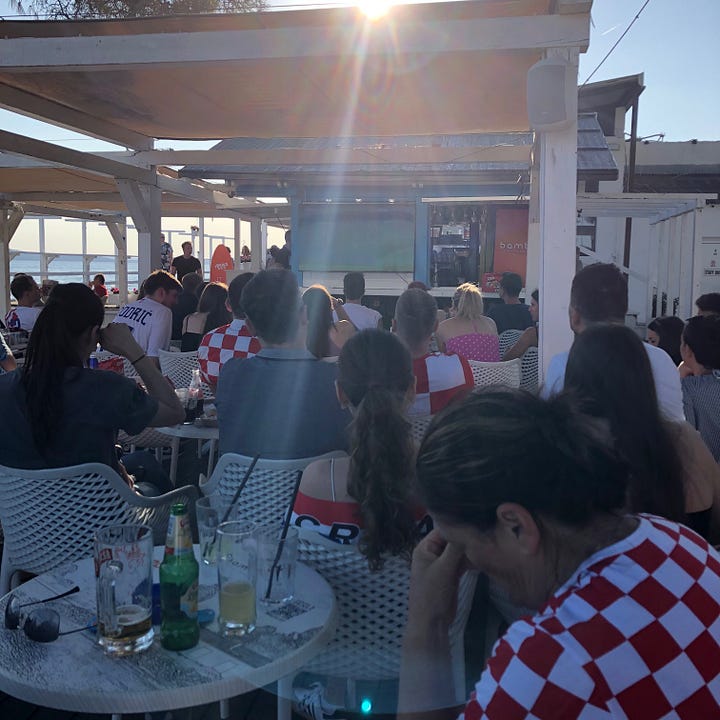
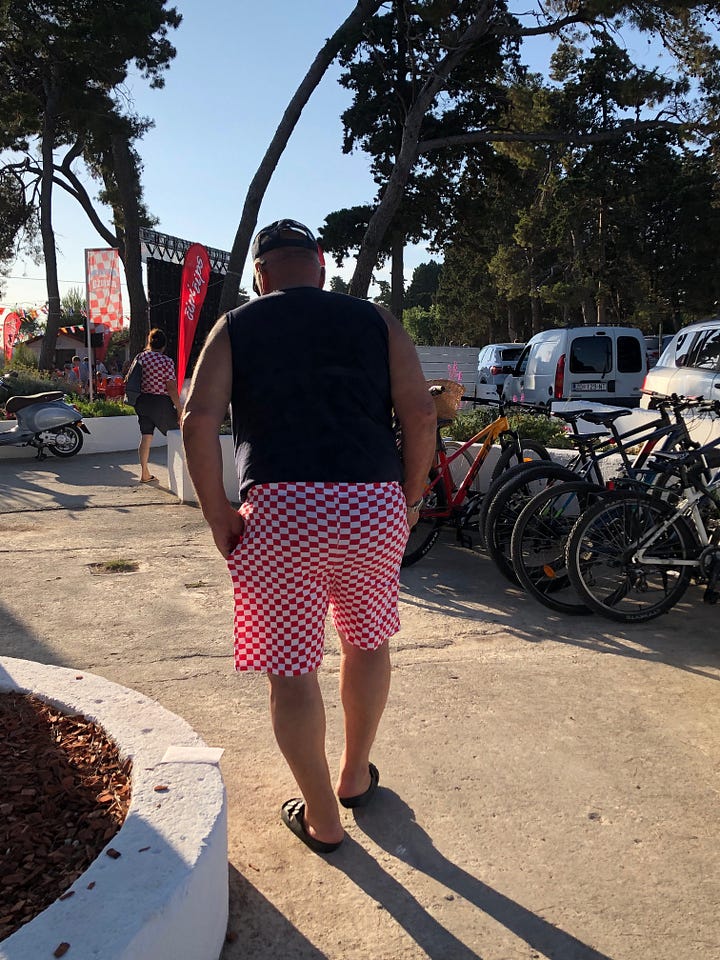
I should have known that Zadar's taxi drivers would be far more stalwart, but I was nonetheless a bit taken aback that there there were no cabs to be had since everyone was still in a bar watching the match. I walked to the nearest bus stop, but the automated arrival board there told me the next one wouldn't be by for nearly an hour. After the 10 kilometers or so I had walked that morning, I did not relish the idea of trekking another five back to town, so my relief was tremendous when I spied a stand of share bikes in the distance. I hurried over, pulled out my phone to download the app...and realized I had just pulled out my phone to download an app.
Did I think about cheating? Of course I thought about cheating. But Andy had not sent me to Zadar to have me blithely abandon the founding principles of The Unplugged Traveler. I embraced my own stalwartness, and started walking.
It wasn't so bad. The walk gave me a chance to see another part of the city which, if not exactly alluring, at least had some faded old waterfront mansions. And, after three or four kilometers, it led me to the boatman.
I had read about this particular Zadar tradition in one of the tourist office brochures. Since the 14th century, barkajoli have been putting people eager to avoid the longer walk around in their wooden dinghies and rowing them across the narrowest part of harbor. Boatmen inherit their jobs from their fathers, and in some cases, the brochure assured me, the family legacy stretched back ten generations.
I was a person eager to avoid the longer walk around, and so I was thrilled to see a boatman waiting at the end of a nearby pier. Gregov was not the 10th generation of barkajoli in his family, but he was the third. He hadn't intended to become a boatman, not even when he started helping his dad out--he had other plans. But then, his dad was ready to retire, and Gregov realized he had a feeling for the sea. The fresh air, the waves, they calmed him. “But it’s hard work,” he said. “Manual labor, in all weather. Only when the winds get up to 70 knots do we stop.”
There are five families of boatmen in Zadar now, and they rotate shifts, so that there’s always a boat running, every day between 7am and 11pm. How many trips does he make in a day? “Believe me,” Gregov said. “I never count.”
He still has regular customers who are locals (“Everyone loves a shortcut,” he explained). But like just about everybody else in Zadar these days, he makes a living from the tourism that has boomed in Croatia in the last 20 years. It has completely changed Zadar, he told me, and the people in it. “The old city is just one big tourist apartment now,” he said. “No one lives there anymore. They just go in to work in the shops or to clean apartments.”
“Before,” he added, “it wasn’t that people were lazy, but they were more relaxed, like on vacation. Now, everyone works more, and they only care about making money.”
It was almost exactly what Radomir had told me earlier that day over lunch, and it made me think in broader terms about how tourism is changing Europe. In Karlovy Vary, I had seen how the town’s defining spa culture was disappearing: tourists came now not to participate in that culture, but rather to look at the physical remnants of it—the cicada shells—left behind. Zadar had made me wonder about when and how a city decided to surrender its loveliest, most historic, most meaning-laden parts to passing visitors. But listening to Gregov now, it occurred to me that it wasn’t just the physical spaces being emptied of meaning; so too were the people who once inhabited them.
Did Gregov expect his children to succeed him as barkajoli? “Well, I’ve only got girls,” he said with a grin. “So maybe I need to have more kids.”
A couple of tourists were waiting to board, but he didn’t want me to think badly of him, so he clarified that his girls hadn’t shown much interest in the family business. “It’s not the kind of thing you can do lightly,” he said as he took up the rows. “You have to like big waves.”
The Addresses
Below, paid subscribers will find a list of the places where I ate, drank, and stayed in Zadar. But, a gentle reminder: wouldn’t it be more fun to find your own?

